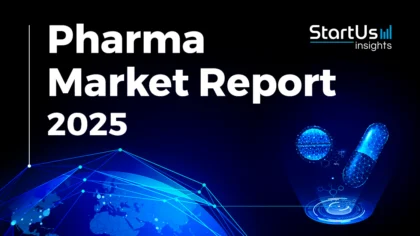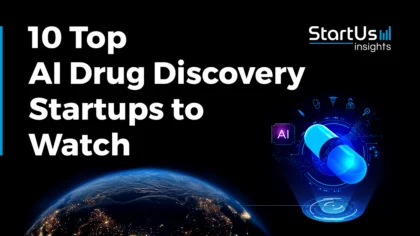Staying ahead of the technology curve means strengthening your competitive advantage. That is why we give you data-driven innovation insights into the pharma industry. This time, you get to discover 5 hand-picked startups advancing repurposed drugs.
Global Startup Heat Map highlights 5 Top Startups advancing Repurposed Drugs out of 70
The insights of this data-driven analysis are derived from the Big Data & Artificial Intelligence-powered StartUs Insights Discovery Platform, covering 2.093.000+ startups & scaleups globally. The platform gives you an exhaustive overview of emerging technologies & relevant startups within a specific field in just a few clicks.
The Global Startup Heat Map below reveals the distribution of the 70 exemplary startups & scaleups we analyzed for this research. Further, it highlights 5 pharma startups that we hand-picked based on criteria such as founding year, location, funding raised, and more. You get to explore the solutions of these 5 startups & scaleups in this report. For insights on the other 65 solutions advancing repurposed drugs, get in touch.
Purposeful develops a Computational Drug Repurposing Platform
Drug development for rare diseases has multiple challenges in clinical trials including enrolling study participants, study design, and evaluation as the patient populations are often widely dispersed and heterogeneous. Advancements in landscaping genetic data and bioinformatics tools uncover alternative methods to de novo drug development. For example, drug repurposing using in silico and in vitro methods finds novel targets for existing drugs. This utilizes artificial intelligence to compute the pharmacodynamics of drugs with multiple targets.
Greek startup Purposeful focuses on discovering alternative effects for rare disease treatment for existing drugs. The startup utilizes AI-based in silico drug repurposing to predict additional effects of the drugs. The startup’s platform workflow combines data analytics, cheminformatics, phenotype prediction, and smart filtering of drug data for prediction modeling. Purposeful identifies repurposed drugs for Fragile X Syndrome, rare inflammatory skin disorders, and cancers.
Segue Therapeutics provides High Content Imaging Screening for Drug Repurposing
The evaluation of efficacy and safety of drug candidates is an essential part of drug development. Generally done through cell screening, an alternative strategy is to profile the cell images using microscopy to identify the drug targets for specific diseases. This involves high-throughput imaging (HTI) or high content imaging (HCI) to capture the cellular processes and potential drug targets. The cells exposed to screened chemical compounds create image fingerprints from an image-based cellular assay. This technique is utilized for combinatorial drug screening as well as repurposing for chronic diseases.
US-based startup Segue Therapeutics utilizes a proprietary high content imaging platform to discover repurposed drugs for infectious diseases and cancer. ST2001 is a cardiac glycoside drug that prevents cancer-associated fibroblasts (CAFs). Drugs in the ST2000 series prevent fibroblast activation; and a combination of ST2001 and ST2022 is under investigation for fibrosis treatment. Segue Therapeutics is also focusing on repurposing drugs of the ST1000 series to treat brain cancer.
QR Genetics offers Personalized Drug Repurposing
The advancement of genomics and precision medicine in pharmaceutical drug development has paved the way for personalized drug development. However, conventional drug discovery requires enormous time and cost, making personalized drug repurposing an attractive alternative. Personalized drug repurposing is an efficient approach to treat rare disorders with patient-specific mutations as well as cancer.
Israeli startup QR Genetics identifies therapeutic solutions for rare diseases. The startup uses an automated machine learning-based computational platform for personalized drug repurposing. The platform analyzes the prediction model combining in-silico (computational) and in-vitro (biological) studies. Once a patient’s genetic data is input into the platform, it performs a personalized search in drug libraries and recommends potential treatment by repurposing drugs. QR Genetics also offers a cell-level prognosis and decision support tool for physicians.
AgeX Therapeutics specializes in Repurposing Drugs for Aging
The drugs used in regenerative medicine function by targeting a cell cycle to enhance rejuvenation, regrowth, and development. Thus, regenerative medicine aids in treating aging and related disorders by increasing the regenerative capacity of cells. Geriatrics requires innovations in biopharmaceuticals that reverse developmental aging and achieve cellular immortality. Startups work on drug repurposing strategies to accomplish advancements in tissue regenerative medicine to treat aging.
US startup AgeX Therapeutics develops stem cell technology for aging-related diseases. The startup’s drug candidate, Renelon, combines a repurposed drug and hyaluronic acid-based hydrogel and stimulates cell development. The startup develops the drug as a topical formulation for the scarless repair of tissues in patients.
Balmes Transplantation repurposes Drugs for Organ Transplantation
The major limitation of organ transplantation is the lack of donors and, more importantly, the graft rejection post-transplantation. Graft rejection makes the person vulnerable to ischemia-reperfusion (IR) injury, which deteriorates the organ by limiting the supply of oxygen and blood. Conventional treatment using immunosuppressants causes adverse effects in long-term use. Therefore, startups and companies are repurposing drugs for anti-rejection and IR injuries.
French startup Balmes Transplantation develops repurposed drugs with fixed-dose combinations to treat organ ischemia-reperfusion injuries. The startup formulates combinations of drug candidates for cytoprotective treatments. Balmes Transplantation is investigating standalone drugs and drug combinations for renal ischemia/reperfusion injury.
Discover more Pharma Startups
Pharma startups such as the examples highlighted in this report focus on artificial intelligence, precision medicine, digital therapeutics as well as additive manufacturing. While all of these technologies play a major role in advancing the pharma industry, they only represent the tip of the iceberg. To explore more pharma technologies, simply get in touch to let us look into your areas of interest. For a more general overview, you can download our free Pharma Innovation Report to save your time and improve strategic decision-making.









